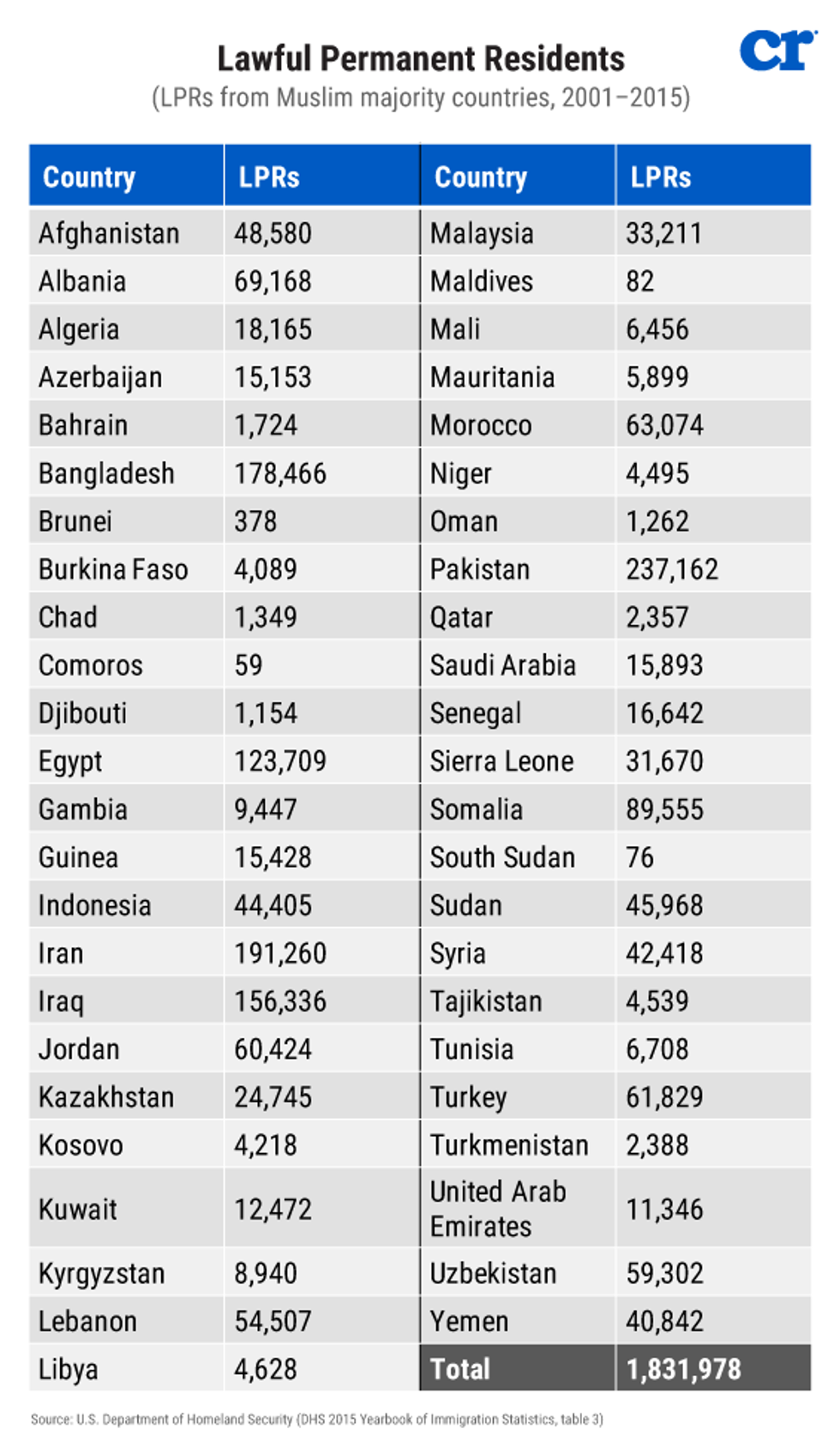
© 2026 Blaze Media LLC. All rights reserved.
For both supporters and opponents of a moratorium on immigration from predominantly Muslim countries, Trump’s revised immigration ban appears relatively inconsequential. We have admitted at least two million Muslim immigrants since 2001 and many hundreds of thousands more on long-term student visas. Only a small percentage would be kept out by the immigration ban, as the broader trajectory of immigration and student visas from the Middle East continues to grow.
The good news for conservatives is that with the expiring deadline of Trump’s first immigration moratorium from selected countries, he decided to immediately continue the ban for some countries. The bad news is that the selection is pretty random and smacks of timidity in the face of the courts and of foreign governments. Which means that once again we have allowed the courts to win, even though, thus far, the Supreme Court has slapped down the silliness from the lower courts.
The original ban included Iran, Iraq, Libya, Yemen, Somalia, Syria, and Sudan. Trump immediately cut a deal with the Iranian-backed government in Baghdad to take Iraq off the list, a decision I criticized at the time. Fortunately, he has extended the ban on Syria, Iran, Yemen, Libya, and Somalia. However, in a bizarre move, he has taken Sudan off the list, made an exception for Iranian foreign students, and then added Chad, Venezuela, and North Korea.
Venezuela and North Korea are non-sequiturs, because we don’t issue too many visas or green cards to Venezuelan nationals and almost none to North Koreans. It smacks of political correctness: a ploy to deflect the discussion away from Sharia Islam just to put on a show for the courts.
As for Chad, it certainly makes sense to put it on the list, given the huge presence in the country of Boko Haram, but this begs a broader question: What about the rest of North Africa and the Middle East, which have the same presence of terrorists and from where we admit many more immigrants and visitors?
When viewed in totality, this list is as random as it comes. Why would we remove Sudan from the list while adding Chad? And while Somalia remains on the list, the new order provides an avenue for non-immigrant visas from that war-torn country under stricter scrutiny. The memo notes that while, unlike with Syria, Somalian officials satisfy “minimum” information-sharing requirements, immigrant visas are still barred because the country is a safe haven for terrorists. Under this rationale, countries such as Saudi Arabia, Pakistan, Afghanistan, Iraq, Turkey, and many more should also be included at least in stricter scrutiny for non-immigrant visas and a temporary suspension of immigrant visas.
Immigration from the Middle East and North Africa by the numbers
From 2001 to 2015, roughly 1.8 million individuals from 47 majority-Muslim countries, mainly in the Middle East and North Africa, have been granted green cards, according to the DHS Yearbook on immigration statistics. That trajectory has grown in recent years. I didn’t include Nigeria, which is roughly half Muslim, from which we have admitted 174,821 immigrants over 15 years. We also admit a tremendous number of immigrants from India, roughly 70,000 per year. While there is no way to ascertain the religious orientation of these immigrants, 15 percent of India is Muslim. These numbers also don’t include the recent surge in refugees (roughly 68,000 Muslim refugees since 2015) during the later years of Obama for those who have not converted their status to a green card.
Thus, it is fairly safe to say we have admitted close to two million Muslim immigrants since 2001. Furthermore, we now admit over 155,000 foreign students every year from the Middle East and have more immigrants from these countries than ever before.
With the exception of Syria, Somalia, and Iran, none of the other countries on Trump’s new list have sent us many immigrants. As you can see in the chart, we take more immigrants from a place like Mali than from Chad and Libya. Moreover, we admit roughly 12,000 students from Iran, for whom Trump has carved out a loophole within the ban on the Islamic republic. Countries like Pakistan, Turkey, Saudi Arabia, Iraq, Bangladesh, and Egypt, which send us a large number of immigrants, foreign students, or both, are not on the list, even though they are saturated with terrorist groups.
As you can see, we admit 45 times as many immigrants from Sudan as we do from Chad. And just this weekend, a Sudanese immigrant opened fire on a church in Nashville, killing one worshiper and wounding several others.
The bottom line is this list is too random … assuming that the goal is really to protect our security. The rationale for this list employs a weak conflation of lack of information-sharing and the presence of terrorist organizations, but those criteria should rope in many more countries. Trump should expand the list to include all nationals or residents of countries with a significant presence of organizations designated by the State Department as terrorists. If not an outright ban, at least subject them to the level of scrutiny the DHS has identified for Somali visa applications.
This revised ban evidences that the Trump administration is being hypersensitive to the lower court rulings, when the Supreme Court has already slapped them down several times. Furthermore, the State Department is being too deferential to foreign governments, such as Iraq and Pakistan. In fact, were Trump to include Pakistan, from which we’ve received the most immigrants of any Middle Eastern country, it would kill two birds with one stone. It could be used as a cudgel against the Pakistani government until it steps up its cooperation against terrorist groups operating within the country’s borders.
Finally, with the clock ticking down until the new fiscal year, Trump has just a few days left to officially shut off the refugee program.
What’s at stake?
Let’s remember what’s at stake here for our national security: The radicalization of many of these immigrants. Dr. Nidal Alsayyed, a brave imam from southeast Texas, was fired from his position for expressing his support for a cool-off period of new immigration from the Middle East. He recognizes the existing problem among the Muslim youth. “We need to stop taking new ones until we fix the existing situation,” said an exasperated Alsayyed.
It’s time to stop tap-dancing around the courts. They do not control our national security. Trump must do what is right and demand that Congress codify his ban by defunding visas to those countries in the December budget bill. A push for judicial reform would be nice as well.
As we look across the pond at the ominous failed European experiment on immigration and the suicidal re-election of Angela Merkel as chancellor of Germany, we must not walk in their footsteps. To paraphrase Trump during the campaign: We either have a country or we don’t.
Want to leave a tip?
We answer to you. Help keep our content free of advertisers and big tech censorship by leaving a tip today.
Want to join the conversation?
Already a subscriber?
Blaze Podcast Host
Daniel Horowitz is the host of “Conservative Review with Daniel Horowitz” and a senior editor for Blaze News.
RMConservative
Daniel Horowitz
Blaze Podcast Host
Daniel Horowitz is the host of “Conservative Review with Daniel Horowitz” and a senior editor for Blaze News.
@RMConservative →more stories
Sign up for the Blaze newsletter
By signing up, you agree to our Privacy Policy and Terms of Use, and agree to receive content that may sometimes include advertisements. You may opt out at any time.
Related Content
© 2026 Blaze Media LLC. All rights reserved.
Get the stories that matter most delivered directly to your inbox.
By signing up, you agree to our Privacy Policy and Terms of Use, and agree to receive content that may sometimes include advertisements. You may opt out at any time.







